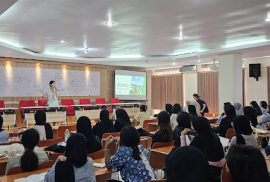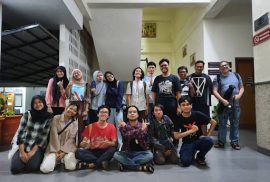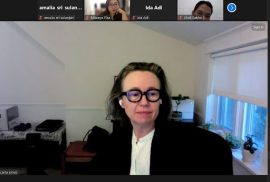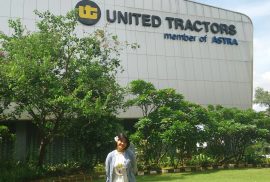SDGs 4: Quality Education | SDGs 4: Access to education | SDGs 4: Enrolment | SDGs 4: Education | SDG 5: Gender equality | SDGs 5: Empower girls | SDGs 5: Empowerment | SDGs 5: Empowerment of women / empower women / women’s empowerment | SDGs 17: Partnerships for the Goals | SDGs 17: Global partnership
Ewha Womans University kembali mengunjungi Prodi Bahasa dan Kebudayaan Korea UGM untuk mempererat kerja sama Prodi Bahasa dan Kebudayaan Korea FIB UGM. Kegiatan ini berlangsung pada Senin, 29 april 2024 di Ruang Multimedia Gedung Margono FIB UGM.
Kegiatan ini dimulai dengan pemaparan materi oleh pihak Ewha Womans University mengenai peluang untuk melanjutkan studi program master di sana. Pemaparan materi dimulai dari program studi yang ditawarkan hingga beasiswa-beasiswa yang bisa didapatkan untuk menunjang biaya perkuliahan. Setelah berlangsung selama 30 menit, pihak Ewha Womans University memberikan kuis kepada peserta. Peserta yang bisa menjawab pertanyaan kuis mendapatkan hadiah yang berupa merchandise spesial khas Ewha Womans University, yaitu gantungan kunci berbentuk kucing.
Ewha Womans University terkenal dengan merchandise mereka yang unik dan lucu, sehingga mereka pun membagikan merchandise mereka secara percuma kepada peserta yang hadir. Merchandise yang dibagikan kepada peserta berupa map, stiker, dan luggage tag khas dari Ewha Womans University.
Kegiatan ini bisa menjadi sumber informasi kepada mahasiswa yang ingin melanjutkan studi ke Korea Selatan, khususnya di Ewha Womans University. Selain itu, dengan kegiatan ini kerja sama antar Prodi Bahasa dan Kebudayaan Korea FIB UGM dengan Ewha Womans University tetap bisa terjalin.
Penulis: Fathiannisa






